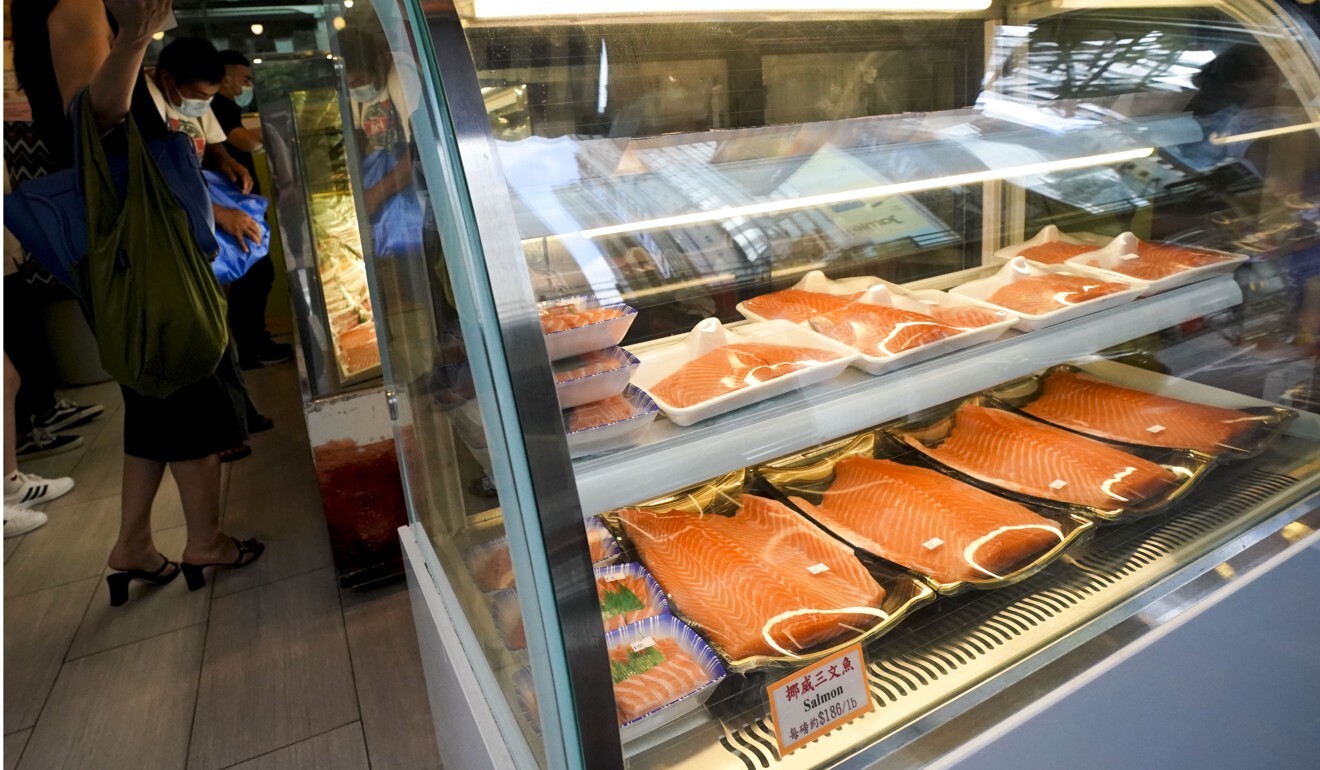
Coronavirus: Hong Kong consumers unfazed by speculation imported salmon linked to new Covid-19 cluster in Beijing
- Centre for Food Safety confirms that 16 samples of imported salmon all tested negative for the coronavirus
- Mainland China has halted imports of European salmon amid fears of a link to a new cluster of Covid-19 cases at a wet market in Beijing
Hongkongers have brushed aside reports that traces of the coronavirus were found on chopping boards used for salmon at a Beijing market, with long lunchtime queues at sushi restaurants and shoppers still buying the popular fish.
The city’s Centre for Food Safety confirmed on Tuesday evening that 16 samples of imported salmon from countries including Norway, Chile, Ireland, Iceland and Denmark all tested negative for the coronavirus. A spokesman for the centre said there was no evidence to show humans could be infected by the coronavirus through food such as aquatic products, based on current scientific research.
Major supermarkets in the capital removed salmon from their shelves and restaurants also dropped the fish from their menus.

01:58
Salmon import ban and partial lockdown for Beijing after new Covid-19 cases in Chinese capital
But in Hong Kong, consumers dismissed speculation over any possible link that new infections in Beijing could have been caused by imported salmon or the packaging.
Lengthy queues formed outside sushi restaurants across the city at lunchtime.
“I'm not concerned about contracting the coronavirus through eating salmon. I think the report from the Centre for Food Safety already confirms we have nothing to worry about,” said a diner who only gave her surname as Ng.
Hong Kong steps up Covid-19 testing to cover all Beijing air arrivals
She was among dozens waiting outside a branch of the Daikiya Japanese Restaurant chain in Mong Kok just before it opened at noon. Among items on offer at the buffet-style restaurant are sushi and sashimi and food is also served to order.
Ng believed that as long as people sat 1.5 metres apart, washed their hands and wore a mask to the restaurant, the chances of spreading the virus were small.
In the same district, prime salmon belly sashimi was sold out at Daikatsu Don, a Japanese rice bowl restaurant. Wait staff said they were unable to replenish stock overnight, as diners had devoured their bestseller.

There were about 12 diners at the small upstairs restaurant around 1pm, and all of them were asked to take their temperature and use hand sanitiser before being seated.
Meanwhile, a fishmonger at City’super grocery store in Causeway Bay said salmon was still a top choice for shoppers.
“Our salmon is mainly sourced from the USA, Norway and Japan, but not from mainland China. Food safety is one of our primary concerns, we will communicate closely with our suppliers to ensure good hygiene during processing, minimising any risk of cross-contamination,” a supermarket spokesman said.
Chinese firm says possible Covid-19 vaccine passes phase two trials
Holida, a preschool teacher from Indonesia who has lived in Hong Kong for seven years, placed two chilled packets of Norwegian salmon fillets into her shopping trolley at Jason’s supermarket in Causeway Bay.
“I think as long as you cook [the fish] properly, it should be no problem,” she said
Terence Lau Lok-ting, convenor of the Food Safety Consortium at Polytechnic University, said: “The negative coronavirus test results on salmon samples indicates a rather slim likelihood that salmon is a coronavirus carrier.”
Lau added that local health authorities should conduct more random sampling tests in the coming weeks to be sure that salmon was not a carrier of the coronavirus, while closely monitoring the situation of new outbreak clusters on the mainland.
Lau advised people not to eat raw fish in general, as uncooked seafood could contain bacteria and parasites, regardless of the coronavirus threat.
Beijing under partial lockdown, raises alarm level amid latest Covid-19 outbreak
He also stressed that fish must be handled at cold temperatures to avoid it from getting spoiled. Under food safety guidelines in Hong Kong, frozen fish should be kept and transported at minus 20 degrees Celsius, while chilled fish must be kept at under 4 degrees.
Lee Choi-wah, chairman of the Hong Kong Chamber of Seafood Merchants, which represents more than 100 importers, said local firms had not seen immediate challenges when sourcing salmon from overseas despite the ban on the mainland.

